Are all school properties affected by this law?
In 2010, Connecticut state legislation banned the application of all pesticides registered with EPA and labeled for use on lawn, garden, and ornamental sites, on the grounds of public or private daycares (as defined in CGS Sec. 19a-77) and schools with grades K-8. The text of the law (C.G.S. Sec. 10-231) can be read at ipm.uconn.edu/school.
The law applies to all turfgrass (lawns, athletic fields, etc.) and maintained landscaped areas anywhere on school grounds (gardens, parking lots, driveways, entryways, sidewalks, playgrounds, fencelines, etc.), and includes high school property or athletic field that is shared jointly with a K-8 school or daycare facility.
Can athletic fields and school grounds be managed without pesticides?
Yes. Properly maintained turfgrass should produce dense and healthy playing surfaces and recreational lawn areas. Optimal levels of fertilizer and irrigation will improve turfgrass density and overall quality. While some weed growth should be anticipated and tolerated, large weed populations may disrupt the playing surface and affect player safety on athletic fields.
For More Details on Connecticut’s Pesticide Ban on School Grounds, See:
Are any pesticide products permitted for use on K-8 school properties?

The law allows for the use of pesticide products that are exempt from federal registration, aka “minimum risk” pesticides or “25(b)” products. However, they must be registered in the state of CT. CT DEEP maintains a list of “minimum risk” pesticide products allowed for use at K-8 schools and day care centers, which can be found at ipm.uconn.edu/school.
Products that have not been registered with the state are not allowed for use on any school grounds, including homemade remedies.
In order for any pesticide product, including state registered “minimum risk” pesticides, to be used on school properties, the local or regional Board of Education must have a written pest control policy. They should also have an Integrated Pest Management (IPM) plan in place, if they have indicated that they have an IPM policy, which identifies products that might be used throughout the year.
A licensed pesticide applicator is required to apply all pesticide products, including minimum risk products, on scho
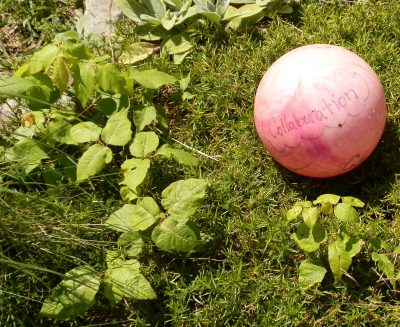
ol properties in the state of CT. All pesticides, including minimum risk products, must be applied safely and according to the manufacturer’s label instructions.
Are exemptions to the law permitted for emergencies?
Yes. The Superintendent of Schools (in the case of a public school) or the local Health Director (in the case of a private school) can authorize an emergency treatment if they have made a determination that pests are present, which pose an immediate threat to human health, and treatment cannot be postponed.
The following are common examples that do NOT warrant an emergency exemption:
- Pest problems that are manageable with allowed products and practices;
- A routine or repetitive pest problem;
- Nuisance weeds (e.g., clover, plantain) or insect pests in the landscape that do not pose an immediate threat to human health (e.g., solitary bees, honey bees, deer flies, black flies).
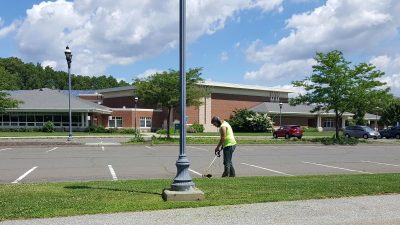
Photo by Alyssa Siegel-Miles.
IPM protocols should always be followed before repeating an emergency treatment. The grounds manager should monitor for the presence of the pest, determine the best course of action, and get authorization as indicated above prior to performing a repeat emergency treatment. Mechanical removal, then use of the least toxic pesticide product, should be attempted before performing any follow-up emergency application with an EPA registered pesticide. Guidance on whether an indoor or outdoor emergency pesticide application is appropriate is available online at ct.gov/deep/IPM (“General Guidance”).
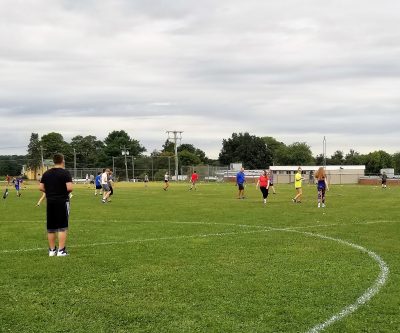
KEY FACTS:
- The Board of Education of each school district must offer parents and guardians of all students enrolled in the school the opportunity to register for notification of any potential pesticide application. Each school is responsible for maintaining the registry.
- The school must inform those parents and guardians who have registered to receive prior notice of any pesticide applications.
- Sanitizers, disinfectants, antimicrobial agents, baits, and aerosol sprays (for stinging or biting insects) are not prohibited under this law.
- Legislation passed in 2015 allows some EPA registered pesticide products to be used, including:
- Horticultural oils and soaps.
- Naturally occurring substances that control pests by nontoxic mechanisms (e.g., microbial - a living microorganism is the active ingredient - or biochemical pesticides).
Questions? Contact Us:
The UConn School Integrated Pest Management (IPM) Program provides educational support to CT school grounds and turf managers that enables them to care and maintain school properties using pesticide-free management and other IPM protocols.
Find more information about Connecticut's pesticide ban on school grounds by viewing UConn's School Grounds Manager’s Primer:
Connecticut’s Pesticide Ban on School Grounds.
For questions regarding products allowed for use on school properties or anything related to the current law, please contact:
CT DEEP Pesticide Management Program
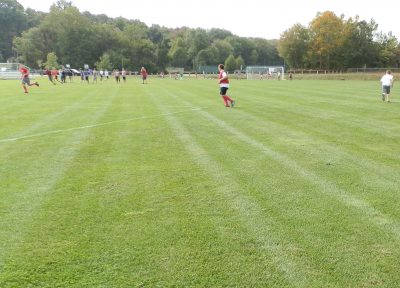
Email: DEEP.pesticideprogram@ct.gov
Phone: (860) 424-3369
Web: ct.gov/deep/IPM
If inquiring about the legality of a minimum risk product, please provide a label copy for review.
Vickie Wallace
UConn Extension, Extension Educator, Sustainable Turf and Landscape
Phone: (860) 885-2826
Email: victoria.wallace@uconn.edu
Funds to support the creation of this brochure were provided by CT DEEP and USDA-NIFA.
Last updated August 2019
Photos by Alyssa Siegel-Miles and Vickie Wallace.
Find the printable pdf pamphlet of this information at What You Need to Know About: Connecticut’s Pesticide Ban on School Grounds.
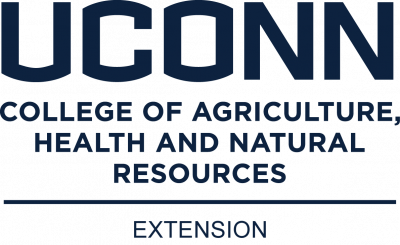  |